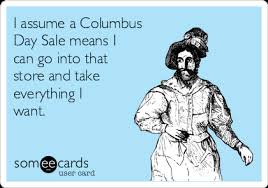On 12 October of 1492, Cristobal Colon, known as Christopher Columbus, having made landfall on the island of Hispaniola, first encountered the native peoples of the Americas. Columbus was certainly not the first European to visit the Americas,and perhaps not even the first visitor from the Old World to visit North and South America since the closing of the land bridge in ancient times. He was, however, the man who opened the door in modern times to vast new lands, full of new plants, animals, and people, and the effect of 12 October, 1492 on the Americas cannot be understated.
The narrative in Western, and especially American history books is mostly one of vauge allusions and rhetoric: a story of exploration, strangers in a strange land, a journey fraught with danger, leading to the discovery of a whole “New World”. The Europeans, after hearing of this new, exciting place, pulled themselves up by their bootstraps and headed across the ocean, bringing their religion, bringing industry, and sharing new crops and resources across the New World – and, of course, the United States, the shining “City on a Hill,” the light of democracy, was eventually forged in this new place.
Lovely. But we know, of course, that this isn’t the full story. The activities of Columbus in the Caribbean are not in dispute; indeed, he writes about them in his own journals, and other primary and close secondary sources document well what occurred in the aftermath of Columbus reaching Hispaniola. For those who do not know of, or are not very familiar with, the whitewashing of Columbus’s history, take a moment to watch a brief recap in this video:
So, Columbus was a murderous, slaving rapist, a man who lusted after wealth and fame, a sycophant scrambling for the approval of his benefactors, who brought red war, terror, and genocide wherever he went. This much is hard question, given the body of evidence. So why would we celebrate such a man? Well – to not do so would disrupt the narrative.
The narrative of the Americas demands that we do not question the righteousness of New World colonization. In this framing, Columbus is key because he was first; to disrupt his reputation, the rightness of his subjugation of the native peoples, is to call into question the rightness of the entire bloody paradigm. We can throw Columbus under the bus as a single, corrupt, sick individual, as he surely was, but after moving from him we must move on to the rest of the story. Many other European “explorers’ were no better then Columbus. From 12 October 1492 to 12 October 2015, indeginous peoples of the Americas have been the targets of theft, murder, genocide, cultural indoctrination, biological warfare, slavery, and strings of broken promises and treaties. The viciousness and oppression has not stopped in the present day, either: just look at the situations in the United States and Canada on the “reservations,” – in effect permanent refugee camps – where poverty, lack of access to basic medical care and education, and crime reign. Even these pockets of sovereignty are being violated; in Canada and elsewhere, the imperialists want to steal more of this land in order to build their oil pipelines. The disruption of this narrative could be dangerous to the story of “progress,” which in turn could threaten the increasingly unstable state system and, even more important, the almighty “bottom line” of those who control the conversation.
I do believe firmly, however, that knowledge of this hidden (in plain sight) history is vital to addressing the situation of oppressed people everywhere. Many in developed countries hide behind this cloak of “enlightened colonialism.” a feel-good narrative that conveniently sets the realities of oppression aside in favor of “progress.” The institution of Indigenous Peoples’ Day rather then Columbus Day in the United states sends a message. First, that the lives of aboriginal people all over the Earth do indeed matter; second, that we no longer are interested in a limited, “Great Man” theory of history, but rather in a true narrative of how we came to be in the situation we are in in modern times; and third, that a Eurocentric view of history is negative to the disciple of history itself, negative to the educational system, and negative to intellectual and social systems the world over.
In a larger sense, of course, Indigenous Peoples’ Day is not what aboriginal people deserve; they deserve justice. They deserve to be included in society with their cultures and dignity intact. They deserve a voice in governments and control over their lands and destines. But, this is a good first step. It is a good gesture. And it is almost literally the very least we can do.
– Eric Scott Pickard is a poet, essasyist, artist, and activist from the Rust Belt city of Youngstown, Ohio. He is a Co-Founder of media collective Free Radical Media


Pingback: The Case for Indigenous Peoples’ Day | CentralTRUTH